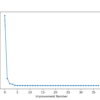The slope of a line, and its relationship to the tangent line of a curve is a fundamental concept in calculus. It is important for a general understanding of function derivatives. In this tutorial, you will discover what is the slope of a line and what is a tangent to a curve. After completing this […]










